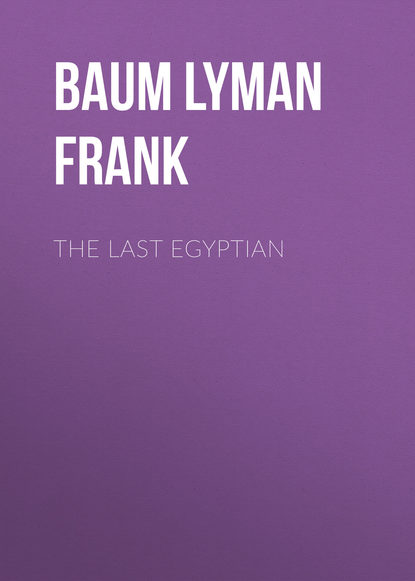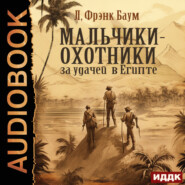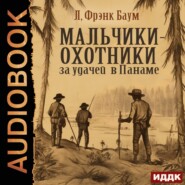По всем вопросам обращайтесь на: info@litportal.ru
(©) 2003-2024.
✖
The Last Egyptian
Настройки чтения
Размер шрифта
Высота строк
Поля
“Yes, and bring the dead to this desolate spot,” replied the dwarf. “It is no longer Hatatcha, but the envelope which she used, and will use again. Therefore it must be carefully preserved. The process will require forty days, as you know. At the end of that time I will deliver Hatatcha’s mummy into your hands. You must then give to me a flat, oblong emerald that is graven with the cartouch of the mighty Ahtka-Rā. Is not that the compact, my prince?”
“It is, my Sebbet.”
“And you know where to find it?” asked the dwarf, anxiously.
“I know,” said Kāra.
The dwarf seemed pleased, and retired to make preparations for his journey. Kāra fell asleep in the cave, for the sun had been terribly hot and the long ride had exhausted him. The blind man’s donkey also lay down and slept.
In the middle of the afternoon Sebbet awakened the young Egyptian and gave him some cakes to eat and a draught of goat’s milk. Then he brought out a stout donkey of a pure white color and mounted it with unexpected agility. Kāra noticed a large sack fastened to the saddle-ring.
A moment later they were riding together across the sands.
“We must not reach Fedah before sundown,” remarked the dwarf, and Kāra nodded assent. So they went at a moderate pace and bore the blistering rays of the sun as none but natives of Egypt can.
At sundown they sighted Gebel Abu Fedah, and it was dark when they entered the narrow street of Fedah. Kāra dismounted from Mammek’s back at its master’s hut, and at a slap on the thigh the donkey bolted quickly through the doorway. Then the young man followed after the dwarf to the threshold of his own dwelling.
The mourners had gone home and Hatatcha lay alone; but someone had placed a coarse cloth over her face to keep the flies away.
The dwarf drew from his pocket a rush-candle and lighted it. Removing the face-cloth he gazed for several minutes earnestly upon the features of the dead woman. Then he sighed deeply, untied the sack from his saddle and blew out the flame of the candle.
Kāra stood in the archway, looking at the slender rim of the moon. In a short time the dwarf’s white donkey paused beside him. The sack, now bulky and heavy, hung limply across the saddle. Kāra could see it plainly in the dim light.
He put his hand on the sack.
“Will it ride without tumbling off?” he asked.
“I will hold it fast,” replied the dwarf, springing upon the donkey’s back behind the burden. “Poor Hatatcha! She will not know we are taking our last ride together in Khonsu’s company.”
“Good-night,” said Kāra.
“Good-night. In forty days, remember.”
“In forty days.”
“And the emerald?”
“You shall have it then.”
The donkey hobbled out of the archway and passed silently down the little street. Presently it had faded into the night and was gone.
Kāra yawned and looked attentively at the huts. In only one, that of old Sĕra, a dim light burned. The man frowned, and then he laughed.
“Let the dragoman have his Nephthys,” he muttered. “For me Cairo, London and the great world beckon. And women? Bah! There are women everywhere.”
He entered the house and unrolled the mat that hung across the archway, fastening it securely to prevent intrusion.
CHAPTER IV
THE TREASURE OF AHTKA-RĀ
Kāra went to the cavity beside the arch and took from it a small bronze lamp. It was partly filled with oil, on the surface of which a cotton wick floated. The lamp itself was of quaint design, and the young man remembered it since the days of his childhood, but had rarely seen it in use.
Having lighted the wick and spread it with his fingers until it flamed up brightly, Kāra turned his back to the arch and carefully examined the rear wall of the room. The house, as has been explained, was built against a shallow cave of the mountains; but, owing to the irregularity of the hollow, part of the rear wall was of solid masonry, while the other part was formed by the cliff itself. Kāra had never before paid much attention to that fact, but now it struck him as very evident that the masonry had been constructed to shut off an orifice too deep or too irregular to be utilized as part of the dwelling. Otherwise, the continuation of the cliff would have rendered a wall unnecessary. The stones were of large size and were built up and cemented as far as the overhanging rock that formed the greater portion of the roof.
The Egyptian’s eyes rested upon the third layer of these stones, and he counted from the corner to the seventh stone. In appearance this was not different from the others; but Hatatcha’s directions had been exact, and she knew.
He walked to the spot and pressed hard against the right edge of the stone. It moved, and gradually swung inward, the left edge being supported by solid pivots of bronze at the top and bottom.
The opening disclosed was about four feet long by three feet in height, and Kāra at once crept through it, holding his lamp extended before him. Yes; his surmise had been correct – a low, but deep and irregular cavern was behind the wall.
His first care was to close up the entrance by pressing the block of stone back to its former position. There was a bronze handle on the inner side that would permit him to open it again easily.
The cavern felt damp and cool, and when he raised his lamp he saw some deep fissures leading far under the mountain. He selected the second from the left of these rifts and cautiously made his way along the rough floor. At first it seemed that he had made a mistake, for this way was less promising than several of the others; but when he stopped and thought upon Hatatcha’s directions, he knew that he was right.
The rift made a sudden turn and sank downward; but the rocks under his feet were now more even and the way became easier to traverse. A hundred paces farther, the passage ended abruptly in a sharp point where the rock had originally split.
The young Egyptian walked to the extreme end and then carefully measured three paces back again. Raising his lamp, he examined the right wall of the tunnel closely. It contained many irregular cracks and hollows, but one indentation seemed, on observation, to be surrounded by a tiny circle of black, or a color darker than the other portions of the rock.
Kāra uttered an ejaculation of pleasure. He had feared he might not find this spot, in spite of his grandmother’s assurances that it was plain to keen eyes.
Drawing a short, pointed dagger from the folds of his burnous – a weapon he had found in the crypt beside the arch of the living-room – the Egyptian thrust it into the orifice of the rock and pushed until it had sunk in to the very hilt. Then he turned the handle, and a sharp “click” was audible.
Kāra stepped back a pace, and a part of the rock, circular in shape, swung slowly out into the passage, revealing another tunnel running at right angles with the first. Unlike the other, this was no natural fissure of the rock, but an excavation cleverly made by the hands of man. The roof was arched and the floor level and smooth.
The man slipped through the opening and proceeded along the arched passage. He did not close this door behind him, for Hatatcha had warned him not to do so. The floor had a gradual slope and he knew that he was going still farther beneath the mountain at every step. The atmosphere now became hot and stifling and he found it difficult to breathe; but he continued steadily walking for a matter of five minutes – which seemed an hour – holding the lamp before him, until finally he noticed the blaze of the wick flicker, as if a breath of fresher air had reached it.
By this time his breast had seemed ready to burst, and his breathing was fitful and gasping; but he hurried forward and now found the air cooler and fresher and drew it into his lungs gratefully.
The path was no longer downward, and before him he presently discovered a huge pillar of rock, which at first sight seemed to block the tunnel. Rude hieroglyphics were graven upon it. Passing around this at the left, he found himself in a high, vaulted chamber, and stopped with a sigh of satisfaction.
The chamber was circular in shape, and not more than sixteen feet in diameter. An air-shaft in the dome evidently led to some part of the summit of the mountain, for Kāra found himself breathing naturally again.
“This,” said he, “must be the library that Hatatcha mentioned.”
All around the walls of the vault were niches, cut in regular rows and containing box-like receptacles covered with inscriptions and pictures in gaudy colors. In the center of the room stood a large round slab of granite, finely polished upon its upper surface.
Kāra drew a box from its niche and set it upon the granite slab beside his lamp. Then he took from it a roll of papyrus, which he examined with interest.
Yes; he had read it before. It was one of those so often mysteriously produced by his grandmother to assist in his education. He examined another roll, and a third, leisurely and with care. These also he knew well. There were two hundred and eighteen rolls of papyrus in this ancient library, and the knowledge they contained had all been absorbed by the young Egyptian years before. He read them easily, and knew at once from their context the different meanings of many signs that are yet puzzling less-favored students of the hieroglyphics.
The manuscripts dated from the fourth dynasty down to the days of the Ptolemies, and, in a large cavity below the rolls of papyrus, were ranged the earlier works of Herodotus, Diodorus Siculus, Manetho, Horapello, Strabo and others, as well as the volumes on modern Egyptian and European history that old Hatatcha had purchased in Cairo within the last few years. Several historical stelæ of the earlier kings of Egypt also leaned against the walls, arranged in chronological order, and this library, founded by Ahtka-Rā, which had been preserved and added to for so many centuries, was a veritable storehouse of the records of his remarkable country.
Kāra smiled queerly as he glanced around the room.
“Others argue concerning ancient Egypt,” he muttered; “but I alone know the truth.”
A pile of papyrus rolls in another cavity seemed of less importance than those so carefully arranged in boxes. Kāra brought an armful of them to the central slab, dusted them with his rope, and selected fifteen of their number after a cursory glance at their contents. The others he restored to their place. This being accomplished, he took up his lamp and returned to the passage, this time circling the pillar of rock to the right.

















